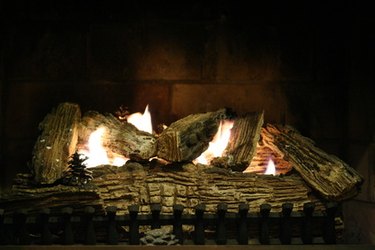
Many people enjoy the warmth and ambiance that a fireplace provides during chilly days and nights. Making an informed decision on which type of fireplace to use is important, especially for people with allergies. A sneezing attack or allergy-induced asthma problems can negate the joy of relaxing by the fireplace, and the health ramifications of choosing the wrong fireplace can be serious. Many opt to get gas log fireplaces in their efforts to avoid allergy symptoms, but gas logs can also trigger symptoms.
Definitions
Video of the Day
Two common options for home fireplaces are wood-burning and gas log types. With the former, a person burns wood to generate a fire. With the latter, material that looks like real wood logs sits inside the fireplace. There is a natural gas line running to the fireplace, which generates the "fire" in the fireplace. You simply turn on a switch, which causes the flames to appear. Both types of fireplaces provide heat, and many gas log fireplaces closely resemble a real fire.
Video of the Day
Wood Fireplaces
Many people use gas logs because they have allergic symptoms when using wood-burning fireplaces. The Mayo Clinic says that wood-burning fireplaces can trigger allergy symptoms. Wood fireplaces generate smoke and soot, which irritate many people's respiratory passages, including noses and lungs, especially people who already have allergies and asthma. Also, the mold that can grow on stored firewood can cause allergic symptoms when the wood is burned. Symptoms include sneezing, stuffy nose, breathing problems and asthma flare-ups.
Gas Logs
For people who suffer from allergy and asthma symptoms, gas logs can be a good alternative. According to Do It Yourself, there is no smoke or soot with a natural gas fireplace, so allergy sufferers can breathe easier, according to The Mayo Clinic.
Gas Log Allergies
There are some risks involved with gas logs. People often find that they have allergic reactions to the fumes from gas fireplaces. The Canada Mortgage and Housing Corporation states that the gases created by gas log fireplaces are chemical contaminants. Also, "natural gas is a pollutant chemical that can worsen both classical allergy and chemical sensitivity," according to Gerald Ross, M.D., former president of the American Academy of Environmental Medicine.
Warning
A gas log fireplace must be properly vented to the outside so that toxic fumes are heading outside rather than staying in your home. When choosing between wood-burning fireplaces and gas logs, there is probably no perfect choice that will eradicate the risk of triggering allergies and breathing harmful substances. An electric fireplace could be a good alternative. It is important to weigh the pros and cons of each option and decide which is the safest for your home.